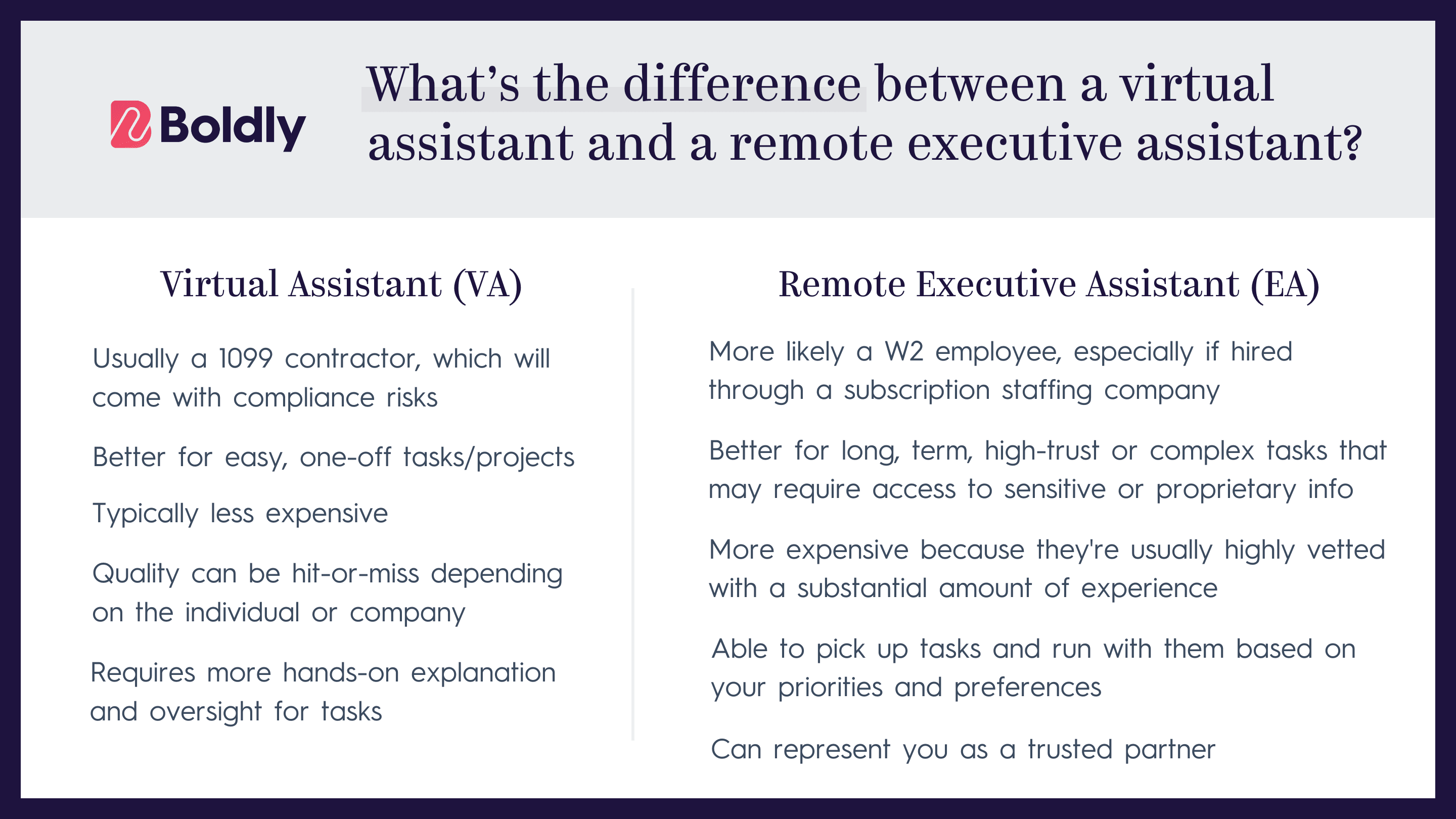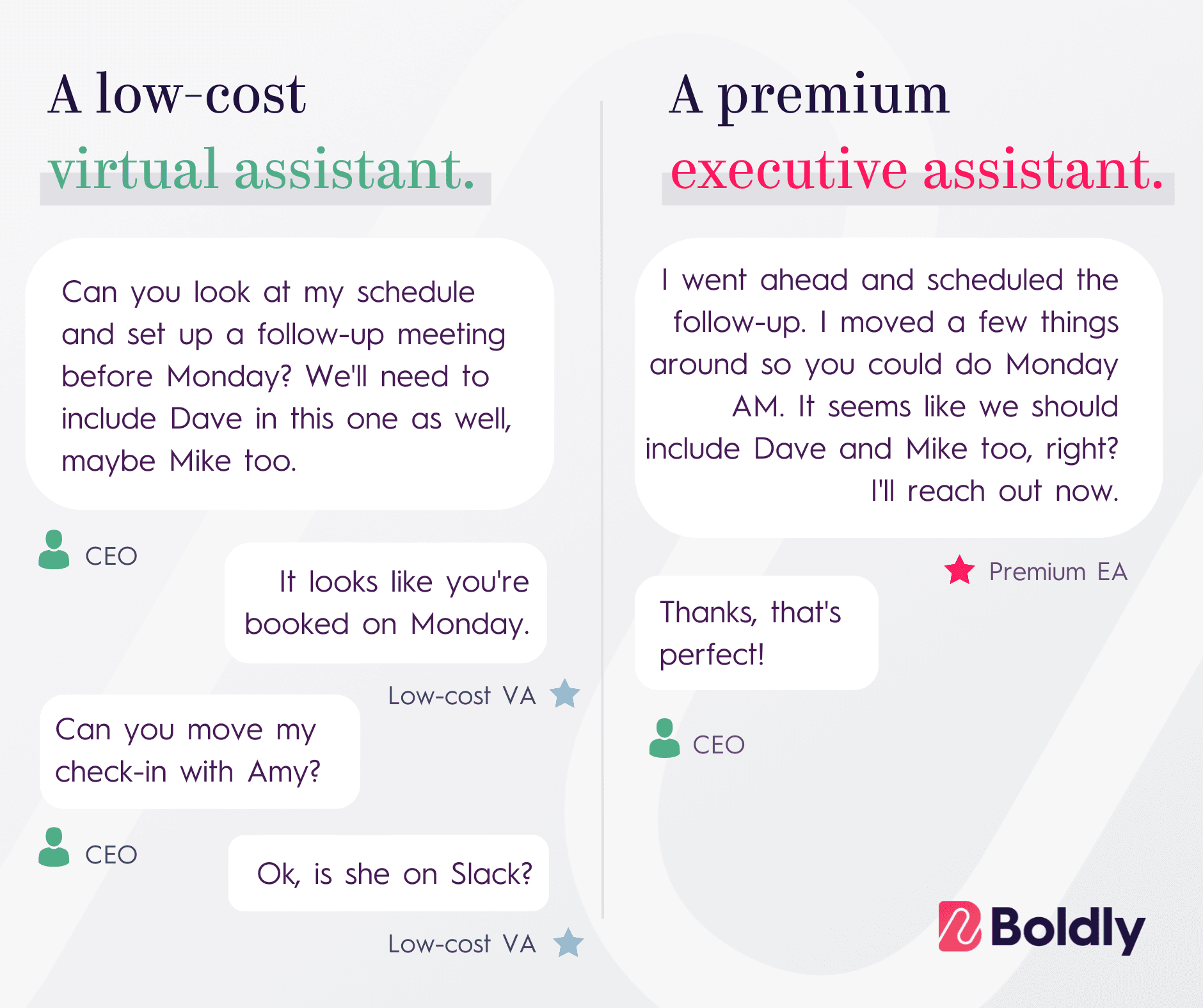Not all remote assistants are created equal.
They may all work virtually and help with different kinds of tasks, but those similarities don’t make them interchangeable. The difference comes down to the complexity of tasks they can handle, the trust you can place in them, and cost.
As we’ll show you, choosing between one or the other is a strategic decision that’s about more than freeing up time or making your work life more bearable. Several factors will determine which type of remote assistant is right for you.
Let’s break it down.
A Virtual Assistant Vs. An Executive Assistant: The Difference
A virtual assistant (also sometimes simply called a remote assistant) typically provides low-cost solutions to easy, one-off tasks or projects.
A remote executive assistant will effectively manage your schedule, inbox, and other complex or sensitive tasks, all while proactively looking for ways to add value and enhance your efficiency. This is usually an experienced professional who can partner with you for the long term.


The difference between a virtual assistant and a remote executive assistant can get confusing because:
- There is admittedly a lot of overlap
- Some virtual assistants are doing remote EA roles (and vice versa)
- You’ll see titles ranging from remote assistant to administrative assistant to virtual executive assistant — and everything in between!
Things start to get even more confusing when you add in the fact that AI tools are now being called virtual assistants as well!
Here’s everything you’ll need to know:
- Why hire an administrative assistant for your team?
- What two factors are most important for an assistant?
- Virtual assistant or remote executive assistant – which is best for businesses?
- How to choose between a virtual assistant and remote executive assistant
- How to find the right assistant for you
We’ll dive deeper into the details of the two in a bit, but choosing to hire either a remote assistant or a virtual executive assistant is a significant decision because of their distinct roles and expertise.
Why Administrative Assistants Have The Potential To Energize Your Team
Maybe the thought of finding, training, and delegating work to an administrative assistant sounds like a hassle — and one that won’t benefit your team enough to be bothered with it. Or maybe you’re simply indifferent to the idea.
But a recent study by The Alternative Board might surprise you: the average entrepreneur spends 68.1% of their time working in their businesses on daily tasks and only 31.9% of their time working on their business.
In other words, you’re likely pouring most of your energy into admin tasks like answering emails or scheduling appointments instead of setting long-term goals and strategic planning. That’s not to say that administrative tasks aren’t important, but they’re keeping your business from growing. You become task-focused instead of growth-focused.
A skilled administrative assistant can easily increase your productivity by 15–20%.
Most executives and busy professionals know they should be delegating most of their tasks. The trouble is, it can be a lot of work to figure out where to start and what kind of assistant to choose.
Your choice between a virtual assistant vs. an executive assistant often hinges on the complexity and nature of the tasks you need help with.
- Virtual assistants typically handle routine clerical tasks.
- High-caliber executive assistants are often involved in more strategic planning and confidential matters. They are excellent at taking initiative and anticipating needs.


And the ultimate kicker is actually knowing what hiring options are available for finding a great administrative assistant. They don’t know whether they should turn to an executive assistant service or hire a full-time employee.
The Two Key Factors In Choosing Assistants
Before you decide between a virtual assistant or a remote executive assistant, there’s a bigger decision to make. It has to do with your potential personal assistant’s experience level and employment status.
Experience Level
Remote work and the gig economy have exploded in popularity. That means thousands of people are opening their doors for business and declaring themselves some kind of professional assistant.
Whether they call themselves virtual assistants or remote executive assistants, the question for you is one of experience. Some may have extensive experience supporting C-level executives at Fortune 500 companies, and others might be fresh to the workforce and looking to get started.
The role of an executive assistant is a mix of complex tasks and personal tasks their executive needs. They might handle complex research, scheduling, travel arrangements, and client communication. These are not skill sets you can pick up overnight.
When choosing an assistant, their experience level is a critical consideration.
Read more: How Much Experience Should Your Executive Assistant Have?
Employment Status
Backup assistants, personal assistants, virtual assistance—whatever you choose, how you structure their employment status is a huge concern.
Generally, remote assistants are either hired as independent contractors or brought on as employees (of either you or a staffing company). The contractor path is attractive if you don’t want to bring on another full-time employee, but it’s a bit trickier than you imagined due to compliance risks.
Not only is there a compliance risk, but independent contractors don’t always stick around for the long term. They’re better suited for project-based work, not long-term virtual assistance.
Consider that common assistant tasks include access to your emails, your schedule, and your team. They’ll be involved in aspects of your personal life and time management. They’ll represent you to your clients, suppliers, and colleagues. That means you’re going to be investing significant time, money, and trust in them. You’ll want them to stick around for the long term, but that isn’t always the case for contractors.
Employees, on the other hand, are properly trained and receive the benefits of W2 employment. The compliance risk is gone, and they tend to be more reliable over the long term.
Virtual Assistant Vs. A Remote Executive Assistant: Which Are Best For Businesses?
This decision often involves comparing an executive assistant vs admin assistant (or even a personal assistant vs executive assistant).
The key is to get clear on your specific needs, as each type of assistant brings a unique set of skills and expertise.
And because every company is unique, a virtual assistant or a remote executive assistant might work well for one, but not the other.
Let’s look at how these two are most frequently defined.
Virtual Assistants Defined
Virtual assistants are administrative professionals working virtually as independent 1099 contractors or provided through virtual assistant services. Some virtual assistants are doing this as their “side gig” while others make this their career. Some function more as personal assistants.
They’re typically a low-cost solution to completing easy, one-off administrative tasks. The rise of remote assistants has made it possible for businesses to access talent globally, expanding the pool of available skills and expertise.
Remote Executive Assistant Defined
A remote EA is different.
They can be hired in-house or brought on as part of a team from a remote executive assistant service or subscription staffing company. They ought to be a W2 employee. They are administrative professionals who are highly organized and skilled in responding to what the C-Suite demands. They focus on supporting management and senior executives with consistency.
Time management, project management, communication, email management, travel planning, and scheduling are just a few of the common executive assistant tasks they can perform, but they can do much more. They may work with one or several clients.
Choosing Between A Virtual Assistant Or Remote Executive Assistant
You can see the subtle differences between a virtual assistant and a remote executive assistant. So how do you go about deciding which is right for you? Does it matter all that much?
We think it matters quite a bit.
The support you get from one is very different from the other. To make it easy, we have five questions to help you decide.
1. Do you need a dedicated assistant for consistent communication?
A dedicated assistant is someone you work with long-term on all of your individual tasks. In contrast, working with a pool of administrative professionals means assigning tasks to the general pool without knowing who will do them. Some virtual assistant services offer a mix of both options.
The question for you is one of consistency and your ability to communicate.
With a dedicated personal assistant, you both learn how each other works and it takes less communication. With a pool, however, you have to fully communicate expectations and details every time. The skill sets found within the pool may vary, meaning the quality of work is also inconsistent.
Most remote executive assistants are dedicated to one or a few clients at a time and will work with those clients for the long term. They understand expectations and adapt to communication styles. Because they will often have experience in complex tasks, they can fully support each client without relying on other outside resources.
When you’re thinking about the type of solution that’s right for you, it’s important to look at the type of tasks you’re going to assign.
If your tasks require insider knowledge about your business, a personal touch, or knowledge about your preferences, a dedicated solution is your best bet.
2. Are you comfortable if they manage (and therefore read) your email?
How complicated or sensitive is the work you need your personal assistants to do?
If you’re not comfortable with the thought of your current personal assistants in your emails, you probably chose the wrong virtual assistant services as your solution.
Busy professionals often stumble over the importance of understanding that complexity and sensitivity of tasks dictate which kind of personal assistants are best.
A lot of administrative tasks are more involved than they might look on the surface.
Some might deal with proprietary or personal information, or have significant potential to impact your company’s reputation. Social media management, for example, sounds easy enough, until you realize it’s a serious point of contact with the public and affects how your company is viewed.
Tasks that are easy for you to do might be very difficult to describe how you want them done, and to trust that they’ll be done right. You might not even be aware of the assumptions you make about preferences or work style when you hand it off to someone else, meaning your expectations can’t possibly be met.
For high-knowledge, complex, and sensitive tasks—the kind where a deep understanding of you, your personality, your goals, your team, and your clients matters—a dedicated solution is the better option for you.
It’s also important to consider the sensitivity of your tasks.
Ordering office supplies seems benign, but you’ll be sharing your credit card information. Are you comfortable tossing that to a pool, or would you rather have a dedicated assistant handling that? Now take that further, and imagine a random person handling personal information necessary for booking travel, reading and answering your emails, or working with clients you don’t want competitors to know about.
Here’s a general rule of thumb: if you’re uncomfortable with having your assistant in your emails and even personal information, you probably need a dedicated assistant.
It comes down to finding a remote EA you can trust—the most essential ingredient of a productive working relationship.
3. What task turnaround time and working hours do you expect?
Virtual assistant services that don’t offer dedicated assistants often have longer turnaround times for getting your tasks done. Many don’t require their virtual assistants to respond immediately, and they might not even have working hours that match yours.
Because remote executive assistants are a dedicated solution instead of a pool solution, turnaround is much faster.
While even your dedicated remote executive assistant can’t promise 24/7 availability, most set a standard schedule with their clients as to when they’re going to be online. They are dedicated to your specific needs and can give you near-immediate responses during those time windows.
4. What’s your budget?
Using a shared virtual assistant, or working with a virtual assistant service that offers a pool to work from, is likely cheaper than a dedicated remote executive assistant.
Other things affect pricing as well, such as their experience level, how much access you get, promised turnaround time, or whether they’re located in the United States or elsewhere. If you’re working with a 1099 contractor, their hourly rate will vary.
Keep in mind that not every virtual assistant service vets their employees at the same level—meaning experience and skill sets vary wildly—and this is also reflected in pricing.
On the other hand, here’s how much an executive assistant costs and how to calculate the ROI of this admin investment.
Boldly’s executive assistants have an average of 10+ years of experience and many have worked for Fortune 500 companies. Because of that, companies like us will have a higher hourly rate. However, because you’re working with a dedicated fractional executive assistant, it’s still going to be a more cost-effective option than hiring someone of the same caliber in-house.
5. Do you need an assistant for short-term projects or long-term support?
The final question to ask yourself is how long you’ll need your assistant.
If you need short-term or project-by-project support, you can choose from a variety of different gig-type options for virtual assistants (e.g. Upwork).
If you’re looking at long-term support though, a dedicated remote executive assistant is what you need.
Pro Tip: When you work with an experienced EA, they can often function as an “executive administrator vs an executive assistant.” For you, this means they can operate with intimate knowledge of your business and look at situations through a leadership, or managerial, lens.
And because you’re looking long-term, you need to be sure the virtual assistant service you get your assistant from is retaining them long-term.
In other words, find a company that has a reputation for taking great care of their people. They should employ them as W2 employees with competitive pay and benefits, and be dedicated to retaining great people. Glassdoor is a good place to start that research, as are client testimonials.
Where To Find A Great Virtual Assistant
At this point, you probably know what kind of assistant will meet your needs — now where can you find the best virtual assistants?
If you’re looking for a quick overview, here’s our list of the best US-based virtual assistant companies and some tips for choosing the best virtual assistant.
Another great place to start looking is virtualassistantassistant.com. It’s a site that has real reviews from clients on a wide range of virtual assistant companies, including cost comparisons and descriptions of the strengths and weaknesses of the most popular VA companies.
Where To Find A Great Remote Executive Assistant
If a more permanent, high-quality solution is what you want, you’ll be looking for a dedicated remote executive assistant. Here’s our list of the best remote executive assistant companies.
You can either begin by posting the job and recruiting/hiring your remote EA in-house, searching through remote staffing agencies, or you can check out subscription staffing from Boldly. No matter what route you choose, you’ll want to make sure to find an executive assistant you can trust.
Boldly is a unique solution to hiring quality remote talent that lets business owners and executives subscribe to incredibly talented assistants for one simple monthly payment. They can get access to Fortune-500 trained talent for key roles for the long term.
This actually solves three problems when looking for a dedicated remote executive assistant:
- You won’t need to recruit and hire on your own. On average, it costs over $4,000 to recruit, and almost $2,000 to train a new in-house employee, on average. That’s before paying any salary.
- Your assistant will be around for the long term. Our team members have flexible, stable, W2 employment with benefits, and a company focused on their happiness and retaining them for the long term — and more than double the industry average.
- Your assistant is of the highest quality. You’ll get to work with someone who has been thoroughly vetted and has more than 10+ years of professional experience as an executive assistant.
Premium subscription staffing is getting popular precisely because more leaders demand these advantages: the flexibility to scale quickly at a lower cost, and without the hassles of recruiting and hiring.
More Frequently Asked Questions
Can an executive assistant work remotely?
Absolutely! In fact, the executive assistant role can be a great fit for a remote or hybrid schedule. With strong communication skills and the right technology, experienced executive assistants can handle scheduling, inbox management, travel coordination, and other administrative duties without needing to be physically present in the office. However, it’s not as straightforward as allowing your EA to work from anywhere — there are legal considerations and communication pitfalls. We’ve put together our top strategies for remote success with your EA.
These types of assistants are usually called virtual executive assistants or remote executive assistants.
What are the main differences between a virtual assistant and an executive assistant?
It’s all about complexity and strategic value. Virtual assistants typically handle routine, task-based support like scheduling and data entry. In contrast, executive assistants offer more comprehensive, strategic support—including decision-making assistance, complex project management, and proactive problem-solving.
What roles or titles are higher than an executive assistant?
In many organizational structures, roles like Chief of Staff, Chief of Operations (COO), and/or Operations Manager might have broader strategic responsibilities that extend beyond an executive assistant’s typical scope. Here’s what you need to know about the differences between an executive assistant and a Chief of Staff.
Although they may share the same title, executive assistants who support higher-level executives may “outrank” EAs supporting lower-level managers or directors. You’ll sometimes see these called Executive Assistant to the CEO, Senior Executive Assistant, Chief Executive Assistant, or C-Level executive assistants.
What is a C-level executive assistant?
These are highly specialized professionals supporting top-tier executives like CEOs and CFOs. They handle extremely sensitive information, contribute to strategic decision-making, and often serve as a critical bridge between executive leadership and the broader organization.
What is another name for a virtual assistant?
You might hear roles like “remote administrative assistant” or “online assistant” used interchangeably, typically emphasizing their task-oriented, remote support model. The VA title can often be shortened to just “assistant.” One confusing note is that AI tools are now starting to be called “virtual assistants” or “AI virtual assistants.”
What is another title for an executive assistant?
Other titles for executive assistant could be executive coordinator, personal assistant, personal executive assistant, or even “assistant to the [title]”. While these titles may seem nuanced, there are many overlapping priorities and skill sets — which makes things even more confusing!
What skills are important for a remote executive assistant?
The most critical skills blend technical proficiency with strategic thinking. Exceptional communication, razor-sharp organizational abilities, and proactive problem-solving are all part of the day-to-day. We’ve put together a guide to everything you need to know about what a remote executive assistant does and what skills are important.
Whichever Solution You Decide On…
If you’re sold on virtual assistance, meaning you’re ready to outsource your administrative duties to a remote assistant, you’re taking a step in the right direction.
Whether you opt for a virtual executive assistant, a traditional in-office executive assistant, or a hybrid role like an executive assistant personal assistant, the key is to find a solution that aligns with your specific needs and working style.
The world of remote work has opened up new possibilities, allowing businesses to access top-tier talent regardless of geographical limitations. By carefully considering your requirements and the unique advantages offered by different types of assistants, you can find the perfect support to help drive your business forward and free up your time to focus on strategic growth.
Handing off these tasks is the best way to regain your time and focus on growth and the future of your business while knowing day-to-day operations aren’t suffering.
How you do that, and which choice you make, depends on careful consideration. If you’re interested in learning more about subscribing to your next remote executive assistant, get in touch here.




